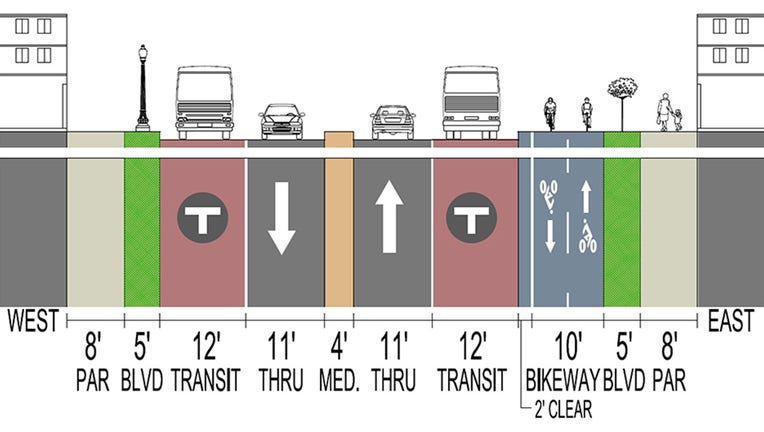Hennepin Ave redesign fails to secure Mayor Frey veto override

The current rendering of the Hennepin Avenue redesign proposed through Uptown.
MINNEAPOLIS (FOX 9) - The fate of a redesign of Hennepin Avenue through Uptown Minneapolis is undecided yet again after the Minneapolis City Council failed to reach the required votes for an override of Mayor Jacob Frey’s veto.
Taken up during its June 30 meeting, the council failed to secure a two-thirds veto override by a vote of 8-3. Nine total members were needed to override both the mayor’s veto of the plan design and the parking restrictions it would implement. The decision would have taken one council member to change their previous vote.
The council had previously voted to pass the redesign and reconstruction plan for one of the city's busiest streets – including proposals that cut vehicle lanes down to two, added 24/7 dedicated bus lanes and two-way protected bike lanes between Lake Street and Franklin Avenue.
"I’m frustrated and alarmed that this plan is receiving so much pushback and resistance," said council member Robin Wonsley after the vote. "It’s disappointing that this body’s actions have not aligned with our words that we care about working class people."
The agenda item, and redesign plan, were formally moved back to committee for discussion.
"I have stated over and over again why this project matters so deeply and who it prioritizes … I really hope that in these next couple of weeks I see some spirit of collaboration from the mayor’s office in getting to some sort of consensus and agreement on how we move forward on this layout, so this doesn’t become the next thing we just talk about and fight over for months," said council member Aisha Chughtai, a strong proponent of the plan. "That isn’t productive or helpful for anyone. We hope very soon we are going to present to you something that will work for all of us."
Businesses object to plan, Mayor Frey vetoes
After months of committee discussion between council members and businesses, the Hennepin Avenue redesign plan was approved by the Minneapolis City Council in June.
But the success was short-lived, as Mayor Frey sent a letter to council members informing them that he had vetoed both the layout for the Hennepin Avenue South Street Reconstruction Project, and a resolution directing the city engineer to establish parking restrictions on Hennepin Avenue South between Douglas Avenue and West Lake Street, per the approved layout.
"I continue to support the public works recommended layout, which has been unaltered since it was introduced in late 2021. The proposed layout features transit priority lanes, an off-street bikeway, and significant safety improvements – all of which effectively reprioritize how we use public space to improve the lives of Minneapolis residents," Frey said in the letter. "I fully support a bus-only lane with specified hours of operation to reduce congestion and vehicle miles traveled. I cannot, however, support keeping bus-only lanes 24 hours a day when buses do not run 24 hours a day. This would ignore the countless small businesses, many of them BIPOC-owned, who compromised both for the presence of a protected bike lane and prioritized bus lanes at the expense of a substantial amount of parking. Many of those same business owners and employees have navigated profound economic stressors ranging from the global pandemic, the civil unrest of 2020, rising inflation, and a workforce shortage. Let's at least show a willingness to work with them."
If implemented, the design would have left behind approximately 20 parking spots, for which businesses along the street have been fighting.

Business owners say they will leave Hennepin Avenue if parking spots are eliminated
Small businesses on Hennepin Avenue say the proposal to redesign one of the busiest streets in Minneapolis may force them to move.
"We can achieve our shared climate and transit goals while preserving a reasonable number of parking spaces for community businesses by allowing for a flexible operational plan that is capable of offering transit service up to 24 hours a day," Frey said in the letter. "I am urging you to work with my administration and Public Works leadership team to do exactly that. This plan must be driven by metrics such as transit delay, speed, and reliability; corridor operations; and safety."
Previously several council members have questioned the effectiveness of the design, despite agreeing with its overall objectives.
"Although it’s well-intentioned the concern I have is that we’re going to end up with stop-and-go traffic. All it’s going to take is one person parking in that [dedicated bus] lane for that to impact operations and leave busses waiting," said council member and committee chair Andrew Johnson at a June 9 meeting. "We’re going to have people being ticketed, traffic backed up, and it’s going to be a mess – and we don’t really have any example of this working successfully yet. The idea is that within a couple years we will figure it out, but I think that is backwards … I feel like this is set up where people might be promised one thing, and getting another."
To date, council members Robin Wonsley and Aisha Chughtai remain adamant that 24/7 dedicated bus lanes remain part of the plan.

